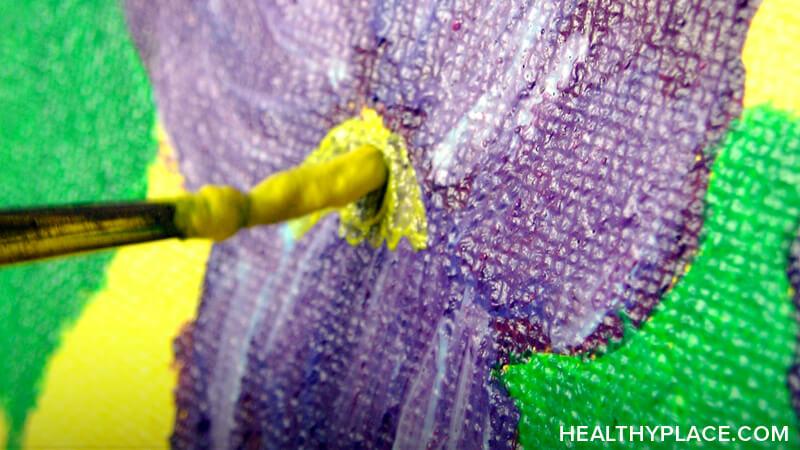Manage Dissociative Identity Disorder with Art Therapy

Art therapy has helped me manage dissociative identity disorder (DID) long before I was diagnosed with DID. When I was able to hold a pencil with my hand, I realized that I could transport myself to anywhere my imagination could take me. I would spend literally hours in my bedroom, doodling and doing anything I could to get away from the trauma of my household.
It wasn’t until years later that I realized what I might have been doing from a very early age is art therapy for DID. Although I still draw and paint today, by no means do I consider myself to be a professional artist. Instead, I simply continue to use art as an outlet, or a way to let out my emotions.
Art Therapy and DID
As I’ve become familiar with my own mental illness, I’ve been nothing but pleased at the growing trendiness of all things art. Take adult coloring books, for instance. Not only can anyone use them, but they seem to tap into that special section of the brain that delivers relaxation and anxiety relief. Even those who are not living with a mental illness can find pleasure in sitting down with an adult coloring book and a pack of colored pencils.
But what I’ve found over the years, as I continue to incorporate art into my own healing journey, is that you don’t need something as structured as a coloring book. Take a simple sketch pad and pencil, for example. Sitting down and doodling, even if you aren’t proud of the final product, can be an extremely effective way to allow emotions to flow outward.
The same can be said about painting, if you want to use a different medium. Take a plain canvas from a big box crafting store, for instance. Add a pack of brushes and a tube of acrylic paint to the mix, and you’re ready to express yourself in a whole new way.
Art Therapy and DID Personalities
Art has been an incredibly effective tool in allowing my various personalities to shine through in their own special manner. I can easily look at paintings and drawings I’ve done today and credit each one toward a specific personality, or many (depending on which ones took part in the creation process).
Most importantly, I can use art to “take the temperature” of my various personalities. For example, if I sit down with a sketch pad and the final creation appears erratic in nature, I can usually gauge whether one of my personalities needs a little extra attention.
Healing exercises are certainly not “one-size-fits-all,” but art is an activity that anyone can do, and the end result has the potential to be tremendously effective.
Have you used art therapy to help with DID? Is it something you do regularly? Share your thoughts on DID and art in the comments.
APA Reference
Vermes, K.
(2020, April 7). Manage Dissociative Identity Disorder with Art Therapy, HealthyPlace. Retrieved
on 2026, January 10 from https://www.healthyplace.com/blogs/dissociativeliving/2020/4/manage-dissociative-identity-disorder-with-art-therapy
Author: Krystle Vermes
I suffered my own 'mental crash' in the middle of 2020 and for the first time i picked up some coloured pencils and drew a banana. it looked so real. I tried to learn ancient Greek that night but no I hadn't developed a photographic memory. But that banana gave me such a sense of achievement that I couldn't stop drawing. Art therapy saved my life.
Hi Krystle I am a professional artist/painter, during the last 12 months I have been unable to paint due to a severe mental health crash which resulted in being assessed by a psychiatrist and being diagnosed with C-PTSD and DID. I had been previously misdiagnosed with Borderline Personality Disorder. My new psychologist encouraged me to start a visual diary and during Lockdown I managed to fill an entire journal with pen drawings and short anecdotes about my day. It has been a life saver and although I still can’t paint the drawing has helped me find a purpose for the day and a way to express myself.
Hello! That is so wonderful to hear! Art is an amazing outlet for many people, and it can become even more important while going through a particularly challenging period. I'm glad to hear about your success with your visual diary.